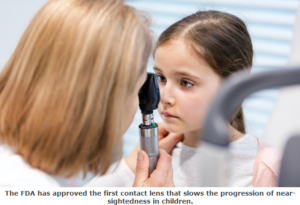Specialty Contact Lenses
“Correcting myopia with traditional contact lenses or glasses, focuses images on the central retina, whereas the peripheral retina is out of focus, resulting in relative peripheral hyperopic defocus,” they write. “From animal studies, it is believed that this peripheral hyperopic defocus may be the stimulus for the development of myopia. Therefore, treatment of myopic progression must eliminate the peripheral relative hyperopic defocus created by spherically correcting ophthalmic lenses/contact lenses, or somehow block the biochemical process causing axial elongation.”
The researchers conclude that eye-care practitioners should consider using multifocal contact lens designs that slow the progression of myopia in children as part of their clinical practice. However, there are many different lens designs available, and all multifocal lenses do not focus light in an effective way for maximum myopia management of progression.
FDA approves MiSight contact lens to slow myopia progression in children
The first contact lens indicated to slow myopia progression in children aged 8 to 12 years has received FDA approval, according to an FDA press release.
The MiSight contact lens (CooperVision) is a disposable, soft lens that is limited for one-time use and is not for wearing overnight, the release stated.
The effectiveness and safety of the lens was tested during a 3-year randomized controlled clinical study consisting of 135 children aged 8 to 12 years compared with a conventional soft contact lens. The results of the study showed that myopia was decreased with the MiSight lens compared with a conventional lens.
“Today’s approval is the first FDA-approved product to slow the progression of myopia in children, which ultimately could mean a reduced risk of developing other eye problems,” Malvina Eydelman, MD, director of the division of ophthalmic, and ear, nose and throat devices in the FDA’s Center for Devices and Radiological Health, said in the release.
Visioneering Technologies eyes US myopia
 Clinical Research Update of 141 Children Wearing NaturalVue
Clinical Research Update of 141 Children Wearing NaturalVue
Multifocal Presented At Global Specialty Lens Symposium (GSLS)
Data Consistently Shows 90% Decrease in Myopic Progression Refractive Error in a Large Sample
Followed for up to 4 years
Highlights of the Clinical Research Update
• Updated data with 141 children wearing NaturalVue Multifocal for up to 4 years,
demonstrated approximately 90% decrease (1.00 Diopters) in myopic progression refractive
error (RE) consistently at each time point examined
• Additionally, in a subset of 36 children, axial length (AL) progression decreased by 54.8%, a
decrease in progression of 0.23 mm, at the 12-17 month point


